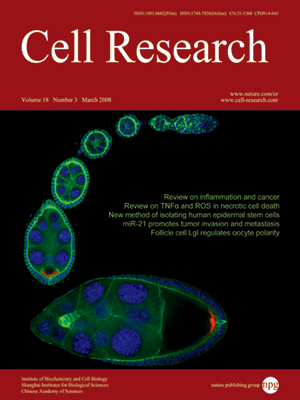
Volume 18, No 3, Mar 2008
ISSN: 1001-0602
EISSN: 1748-7838 2018
impact factor 17.848*
(Clarivate Analytics, 2019)
Volume 18 Issue 3, March 2008: 398-411
ORIGINAL ARTICLES
Differentiation induced by physiological and pharmacological stimuli leads to increased antigenicity of human neuroblastoma cells
Lena-Maria Carlson1, Sven Påhlman2, Anna De Geer1, Per Kogner3 and Jelena Levitskaya1,4
1Immune and Gene Therapy Unit, Cancer Centrum Karolinska, Karolinska Institutet, Karolinska Hospital, KS-ringen, R8:01, S-17176 Stockholm, Sweden
2Division of Molecular Medicine, Department of Laboratory Medicine, Lund University, S-20502 Malmö, Sweden
3Childhood Cancer Research Unit, Department of Woman and Child Health, Karolinska Institutet, S-17176 Stockholm, Sweden
4Current address: W. Harry Feinstone Department of Molecular Microbiology and Immunology, Johns Hopkins Bloomberg School of Public Health, 6 15 N. Wolfe Street Baltimore, MD 21205, USA
Correspondence: Jelena Levitskaya(Elena.Levitskaya@ki.se )
Sympathetic neuronal differentiation is associated with favorable prognosis of neuroblastoma (NB), the most common extra-cranial solid tumor of early childhood. Differentiation agents have proved useful in clinical protocols of NB treatment, but using them as a sole treatment is not sufficient to induce tumor elimination in patients. Therefore, complementary approaches, such as immunotherapy, are warranted. Here we demonstrate that differentiation of NB cell lines and ex vivo isolated tumor cells in response to physiological or pharmacological stimuli is associated with acquisition of increased antigenicity. This manifests as increased expression of surface major histocompatibility class I complexes and ICAM-1 molecules and translates into increased sensitivity of NB cells to lysis by cytotoxic T lymphocytes (CTLs) and natural killer (NK) cells. The latter is paralleled by enhanced ability of differentiated cells to form immune conjugates and bind increased amounts of granzyme B to the cell surface. We demonstrate, for the first time, that, regardless of the stimulus applied, the differentiation state in NBs is associated with increased tumor antigenicity that enables more efficient elimination of tumor cells by cytotoxic lymphocytes and paves the way for combined application of differentiation-inducing agents and immunotherapy as an auxiliary approach in NB patients.
Cell Research (2008) 18:398-411. doi: 10.1038/cr.2008.27; published online 12 February 2008
FULL TEXT | PDF
Browse 1852


